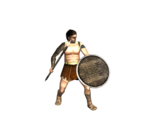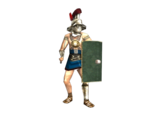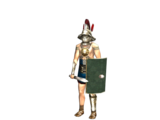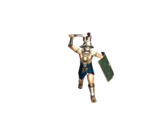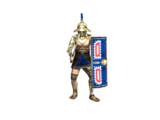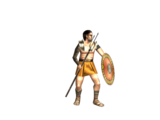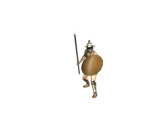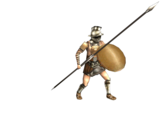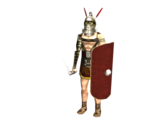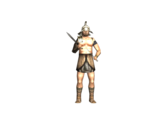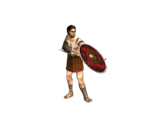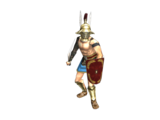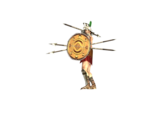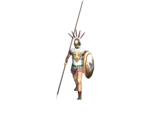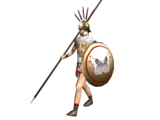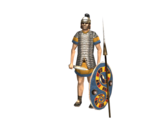Difference between revisions of "Spartacus Total War"
| Line 122: | Line 122: | ||
The Mauritanian kingdom is located in the western part of Africa and has as neighbours their arch-enemies, the Numidians. They have always been enemies, but ever since the crucial help the Mauritanians gave to Rome in the last war of the Numidians against the Senate, they have sworn revenge against each other and war is inevitable. | The Mauritanian kingdom is located in the western part of Africa and has as neighbours their arch-enemies, the Numidians. They have always been enemies, but ever since the crucial help the Mauritanians gave to Rome in the last war of the Numidians against the Senate, they have sworn revenge against each other and war is inevitable. | ||
Although from Punic descendance the royal house of Mauritania relies on the berber tribes of the desert to carry their army duties. | Although from Punic descendance the royal house of Mauritania relies on the berber tribes of the desert to carry their army duties. | ||
| + | |||
[http://www.twcenter.net/forums/showthread.php?t=307304 Mauritanian units.] | [http://www.twcenter.net/forums/showthread.php?t=307304 Mauritanian units.] | ||
| + | ====Numidia==== | ||
| + | [[Image: stw_numidia_symbol.png]] | ||
| + | The Numidians were originally divided into two berber kingdoms, the Massylii and the Masaesily. They were a country divided, each king always fighting for proeminence. | ||
| + | During the Second Punic War, however, Masinissa, the king of the Massylii, allied himself with Rome, while Syphax of the Masaesyli, chose the Carthaginian side. When the war was over and Carthage, along with its allies, was defeated, Masinissa was able to unite Numidia in one single kingdom, profiting from both the lands of the defetead Masaesyli king and lands that were before in Carthaginian hands. | ||
| + | |||
| + | Having in their hands some of the most fertile lands in the world, along with seasoned warriors to maintain their lands free of invaders, the Numidians thrived as allies of Rome rulling almost all of the western north Africa. | ||
| + | |||
| + | When King Jugurta rose to the throne of Numidia, his throne was disputed by one of his half-brothers and civil war started once again. The killing of some Roman business man who weas aiding his rival brought Rome to declare war on Jugurta. | ||
| + | In the first part of the war the Numidians gained the upper hand thanks to the inactivity of the Roman commander, but when Caius Marius assumed control, defeat after defeat followed. Although defeated, the urge of returning to Rome to defend its borders from a germanic threat, allowed Jugurta to stay in the throne, though with a much smaller kingdom. Its bigger part was divided between the new Roman province of Africa and the Mauritanian king who allied with Rome. | ||
| + | |||
| + | Now the Numidians are in a fragile position, surrounded with unfriendly neighbours. With Rome distracted with his own backyard perhaps it is the moment to strike on those who betrayed them, taking back the lands that belonged to the King of Numidia for generations. And then, when Numidia is again a rich kingdom, maybe they can try to face the might of the Roman legions once again. | ||
| + | |||
| + | [http://www.twcenter.net/forums/showthread.php?t=307303 Numidian units.] | ||
Revision as of 04:28, 12 December 2010
Template:Mod3 This page is in production and not finished.
Contents
Description
Spartacus: Total War is a modification that focuses on the gladiator uprising by Spartacus and other events at that time, such as Quintus Sertorius's rebellion in Iberia and the war with King Mithrades of Pontus.
Factions
The Gladiators
 In 73BC, the slaves from a gladiatorial school near Capua revolted against their masters and defeated the school's guards. In their escape they encountered a wagon full of weapons used by gladiators that allowed them to defeat the garrison of Capua that was sent against them as soon as the authorities there heard about the rebellion.
In 73BC, the slaves from a gladiatorial school near Capua revolted against their masters and defeated the school's guards. In their escape they encountered a wagon full of weapons used by gladiators that allowed them to defeat the garrison of Capua that was sent against them as soon as the authorities there heard about the rebellion.
With the news of this first success many other gladiators from Capua, that was famous by its gladiatorial schools, as well as other slaves from the neighbouring towns, joined the rebellious slaves in the hills of Mount Vesuvius, to where they had retreated.
Their leader is Spartacus a thracian soldier that deserted from a auxiliary force of the roman army, was captured, sold as a slave, and then made a gladiator due to his strength. His experience in the ways of war, his intelligence and resourcefullness, allied with the disdainful way the Romans have faced this revolt, have given Spartacus and his people the time to prepare to meet the enemy.
The Gladiator's Units
Shepherd Slingers
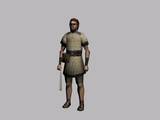 Not many years have passed since the Social Wars that opposed Rome against the rest of the cities in Italy. And although they have been defeated, some of them are always prompt to rebel against the Roman oppressor.
Trained and equiped in Roman style, this troops are a precious addition to Spartacus's army.
Not many years have passed since the Social Wars that opposed Rome against the rest of the cities in Italy. And although they have been defeated, some of them are always prompt to rebel against the Roman oppressor.
Trained and equiped in Roman style, this troops are a precious addition to Spartacus's army.
Italian Officers Although some troops will join the rebellion, they are still commanded by their own officers. File:Stw glad italianofficers.png
The Republic of Rome
 These are turbulent days for the Roman people. After the death of their first dictator in a hundred years, and almost recovered from the devastation that decades of struggle, both abroad and internal, brought, Rome finds itself threatened in various fronts once again.
These are turbulent days for the Roman people. After the death of their first dictator in a hundred years, and almost recovered from the devastation that decades of struggle, both abroad and internal, brought, Rome finds itself threatened in various fronts once again.
Iberia, one of Rome's most ancient provinces, is now nearly completely dominated by the rebel Quintus Sertorius and his iberian allies, and he is not about to content himself with it. Sertorius must be stoped at the price of having him nominated dictator, or even worse... king of Rome!
In the East, King Mithridates and his armies threatened to take over roman influence and power in Asia Minor for years, and now, after they have invaded, yet again, roman provinces and allies there, war against Pontus has been declared.
Parthia also threatens roman territories. The descendants of the Persians have expanded through the lands of Babylonia, Armenia and Arabia until they reached almost Rome's back door. Will the Parthians be willing to halt their expansion or will war follow?
And in Italy, who is this man that drives a horde of slaves, gladiators, and even freemen who have decided to join an army of rebels? Surely nothing more than rabble scum to be delt easily by Rome's armies....
Roman Rebels
 When civil war erupted in Rome, Quintus Sertorius took the side of his uncle Marius and travelled to the Iberia to secure to loyalty of those provinces but was soon defeated by one of Sulla's legates.
Sertorius fled to Mauretania where he organized an army and defeated many of Sulla's legates there. The news os his success in Africa reached the Iberian tribes who were being attacked by Sulla's legates in the region and an embassy was sent asking him to return to Iberia to lead it's armies against the oppressor.
Sertorius soon disembarked on Iberia bringing reinforcements from Africa and with the help of the Iberian tribes, took over almost all of the Iberian territories under the Senate´s control.
The power of Sertorius, however, is not undisputed. They must deal with the Senate's forces still in the peninsula and at the same time strengthen his dominions if they are to survive if something happens to him. Also, it is not clear what will be course his Iberian allies will take when the Senate's forces are defeated...they called upon Sertorius to liberate them from one master's yoke, who says they will bow to another?
Only after all these questions are solved the "rebels", as the Senate calls them, can think about higher projects. Will they march upon Rome to deliver justice to those who kicked them out of their homeland made them pariahs? Or is an independent Roman country in Iberia is enough?
When civil war erupted in Rome, Quintus Sertorius took the side of his uncle Marius and travelled to the Iberia to secure to loyalty of those provinces but was soon defeated by one of Sulla's legates.
Sertorius fled to Mauretania where he organized an army and defeated many of Sulla's legates there. The news os his success in Africa reached the Iberian tribes who were being attacked by Sulla's legates in the region and an embassy was sent asking him to return to Iberia to lead it's armies against the oppressor.
Sertorius soon disembarked on Iberia bringing reinforcements from Africa and with the help of the Iberian tribes, took over almost all of the Iberian territories under the Senate´s control.
The power of Sertorius, however, is not undisputed. They must deal with the Senate's forces still in the peninsula and at the same time strengthen his dominions if they are to survive if something happens to him. Also, it is not clear what will be course his Iberian allies will take when the Senate's forces are defeated...they called upon Sertorius to liberate them from one master's yoke, who says they will bow to another?
Only after all these questions are solved the "rebels", as the Senate calls them, can think about higher projects. Will they march upon Rome to deliver justice to those who kicked them out of their homeland made them pariahs? Or is an independent Roman country in Iberia is enough?
The Celts
 Far to the north, beyond the borders of the mysterious Gauls, live an even more mysterious people...
The Celts were the rulers of western Europe many centuries before the Greek and Roman arrival to their shores and borders. Their influence brought division between those who were closer to them, thus suffering their influences, and those who lived further, maintaining their ancient lifestyle and warfare.
They have suffered influences too. From the people of the great island of Britannia of the Germans against who they fought time and time again.
Far to the north, beyond the borders of the mysterious Gauls, live an even more mysterious people...
The Celts were the rulers of western Europe many centuries before the Greek and Roman arrival to their shores and borders. Their influence brought division between those who were closer to them, thus suffering their influences, and those who lived further, maintaining their ancient lifestyle and warfare.
They have suffered influences too. From the people of the great island of Britannia of the Germans against who they fought time and time again.
The Celt rulers have tolerated their Gallic brothers and sustained their Germanic neighbours invasions for too long. It is time for them to retake Gaul that was once theirs and invade and defeat the Germans once and for all. Who knows? Perhaps even Iberia, a posession lost centuries ago to Iberians, Carthaginians and Romans. To a nation of warriors and heroes, nothing is impossible. And when they have what is rightfully theirs, even the proud romans will have to bow to bow to the Celtic Kings... if they left them alive to be able to bow.
The Eastern Provinces
 After the wars against the Seleucid Empire some of the cities in Syria were somewhat absorbed into the Roman sphere. The truth, however, is that Rome, represented by its Senate, as always been reluctant to create new provinces, thus increasing its bureaucracy and was happy to let those cities be governed by local Etnarchs or even pro-Roman princes from defeated households, as long as they keep paying tribute and wont do anything that goes against the Senate's interestes there.
Now, however, with the war against Pontus and the always threatening Parthians expanding untill the point of reaching roman borders the necessity for a firm and capable command demands that someone from the senatorial ranks is sent to the Eastern Provinces in order to establish order and defend them at all costs.
After the wars against the Seleucid Empire some of the cities in Syria were somewhat absorbed into the Roman sphere. The truth, however, is that Rome, represented by its Senate, as always been reluctant to create new provinces, thus increasing its bureaucracy and was happy to let those cities be governed by local Etnarchs or even pro-Roman princes from defeated households, as long as they keep paying tribute and wont do anything that goes against the Senate's interestes there.
Now, however, with the war against Pontus and the always threatening Parthians expanding untill the point of reaching roman borders the necessity for a firm and capable command demands that someone from the senatorial ranks is sent to the Eastern Provinces in order to establish order and defend them at all costs.
The Senate has sent a Proconsul there with orders to halt the armies of Pontus if they try to invade. Also its his duty to begin diplomatic conversations with the Parthians to remind them of the pact they signed with Sulla, representing the Senate, not so many years ago, and to act accordingly if they don't want to remember.
It's not an easy job. The Senate has already three different wars to fight so its not likely to be able to help with money or troops. So it's up to whoever is in command to act, and act quickly.
The Eastern Provinces territories.
Mauretania
 Having been allies of Rome in the last war that opposed the Republic against Numidia, the Mauritanians profited from many previous Numidian lands given to them by the Senate as a reward for their support.
Having been allies of Rome in the last war that opposed the Republic against Numidia, the Mauritanians profited from many previous Numidian lands given to them by the Senate as a reward for their support.
The Mauritanian kingdom is located in the western part of Africa and has as neighbours their arch-enemies, the Numidians. They have always been enemies, but ever since the crucial help the Mauritanians gave to Rome in the last war of the Numidians against the Senate, they have sworn revenge against each other and war is inevitable. Although from Punic descendance the royal house of Mauritania relies on the berber tribes of the desert to carry their army duties.
Numidia
 The Numidians were originally divided into two berber kingdoms, the Massylii and the Masaesily. They were a country divided, each king always fighting for proeminence.
During the Second Punic War, however, Masinissa, the king of the Massylii, allied himself with Rome, while Syphax of the Masaesyli, chose the Carthaginian side. When the war was over and Carthage, along with its allies, was defeated, Masinissa was able to unite Numidia in one single kingdom, profiting from both the lands of the defetead Masaesyli king and lands that were before in Carthaginian hands.
The Numidians were originally divided into two berber kingdoms, the Massylii and the Masaesily. They were a country divided, each king always fighting for proeminence.
During the Second Punic War, however, Masinissa, the king of the Massylii, allied himself with Rome, while Syphax of the Masaesyli, chose the Carthaginian side. When the war was over and Carthage, along with its allies, was defeated, Masinissa was able to unite Numidia in one single kingdom, profiting from both the lands of the defetead Masaesyli king and lands that were before in Carthaginian hands.
Having in their hands some of the most fertile lands in the world, along with seasoned warriors to maintain their lands free of invaders, the Numidians thrived as allies of Rome rulling almost all of the western north Africa.
When King Jugurta rose to the throne of Numidia, his throne was disputed by one of his half-brothers and civil war started once again. The killing of some Roman business man who weas aiding his rival brought Rome to declare war on Jugurta. In the first part of the war the Numidians gained the upper hand thanks to the inactivity of the Roman commander, but when Caius Marius assumed control, defeat after defeat followed. Although defeated, the urge of returning to Rome to defend its borders from a germanic threat, allowed Jugurta to stay in the throne, though with a much smaller kingdom. Its bigger part was divided between the new Roman province of Africa and the Mauritanian king who allied with Rome.
Now the Numidians are in a fragile position, surrounded with unfriendly neighbours. With Rome distracted with his own backyard perhaps it is the moment to strike on those who betrayed them, taking back the lands that belonged to the King of Numidia for generations. And then, when Numidia is again a rich kingdom, maybe they can try to face the might of the Roman legions once again.
